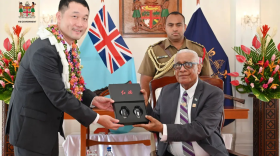China is moving ahead with a controversial surveillance plan in the Solomon Islands. It's aimed at villages, and some opposition politicians warn it's a dangerous precedent when it comes to individual rights.
Reuters reports Chinese police are testing fingerprints, palm prints and other data collection in the Solomon Islands to control social unrest.
It's a surveillance model started under Mao Zedong in the early 1960s to monitor social conflicts at a grassroots level without involving higher legal institutions.
Chinese President Xi Jinping has revived it domestically, but this is the first time it's being used outside China.
Pictures posted to social media by the Solomon Islands police show Chinese police familiarizing children with surveillance drones by playing games with them.
Opposition politician Peter Kenilorea warns the process could be a step toward an authoritarian system, and should face a parliamentary vote.
China struck a security pact with the Solomon Islands in 2022, after anti-government riots the previous year. The protests were fueled in part by politicians who opposed the Solomon Islands switching diplomatic ties from Taiwan to Beijing.
Reuters said the Prime Minister’s Office referred questions to the police, who did not respond to a request for comment.
There has also been no comment from the Chinese Foreign Ministry nor from China's Pacific envoy in Fiji.




